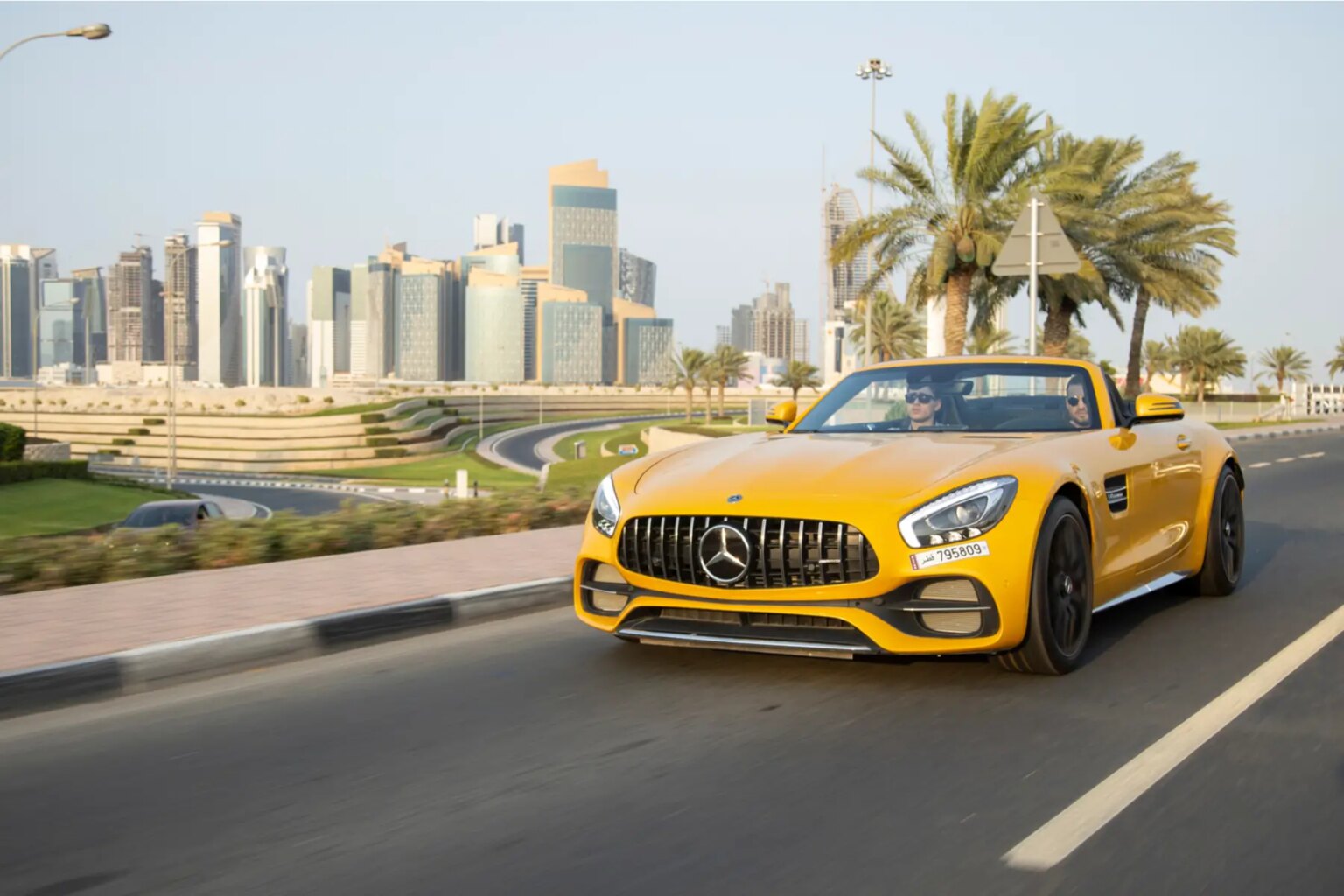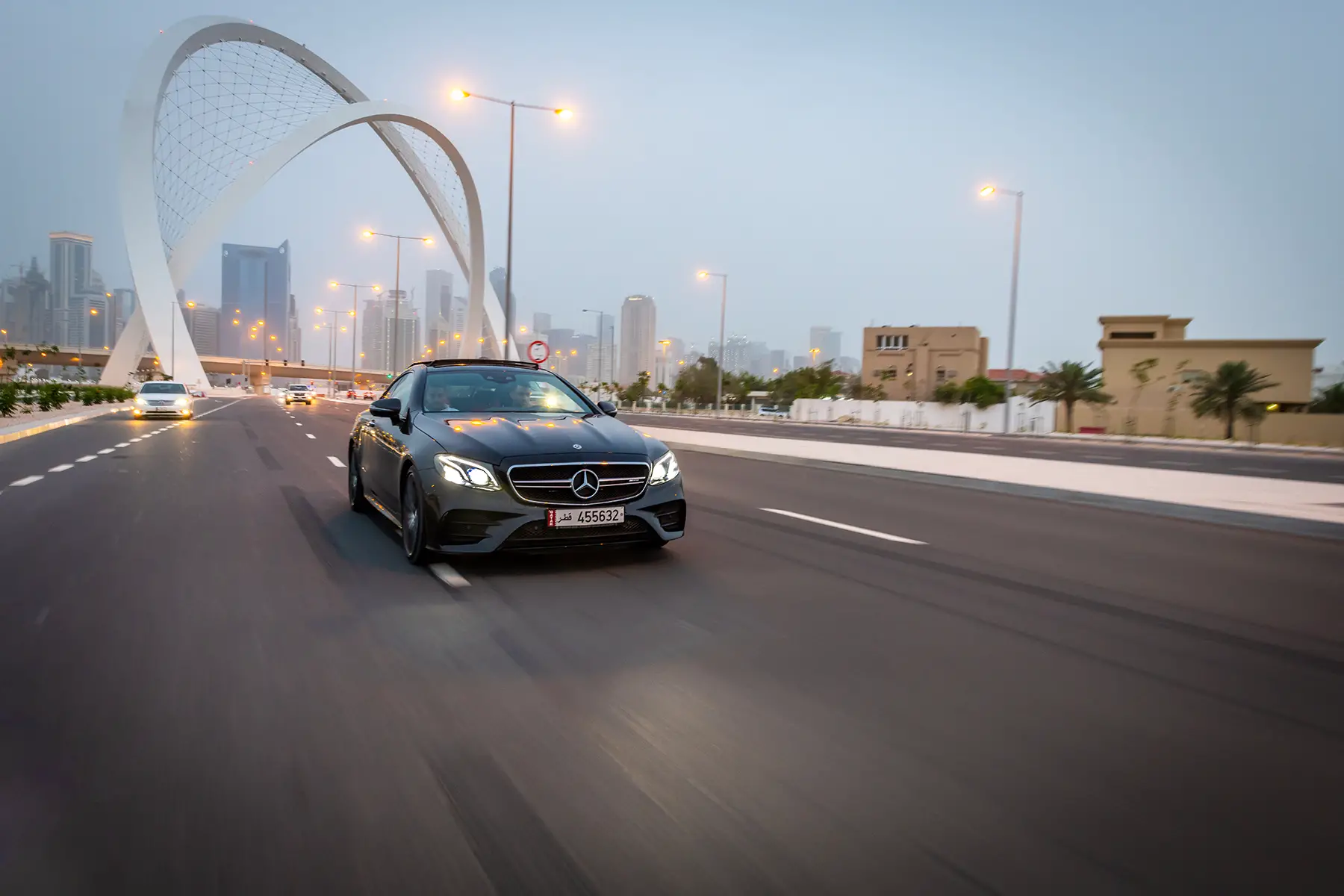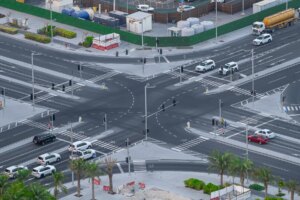For most expats, driving a car in Qatar is an everyday fixture. Patience and common sense are the watchwords here – and the key to safe journeys and intriguing road trips. Here, we present the complete lowdown on driving in Qatar, from those who have been there and done it:
- Driving in Qatar
- Who can drive in Qatar?
- Drivers with disabilities in Qatar
- Getting a driving license in Qatar
- Car registration in Qatar
- Driving costs in Qatar
- Driving rules and penalties in Qatar
- Road signs in Qatar
- Traffic information in Qatar
- Parking in Qatar
- Road accidents and breakdowns
- Cars in Qatar
- Car repair in Qatar
- Tips on driving in Qatar
- Useful resources
Driving in Qatar
A new metro system and bus network may now be operating in Doha, but Qatar, as a whole, remains staunchly pro-car. There are four cars for every 10 people in the country; this would be higher if the hundreds of thousands of migrant workers who never use one are taken out of the equation.
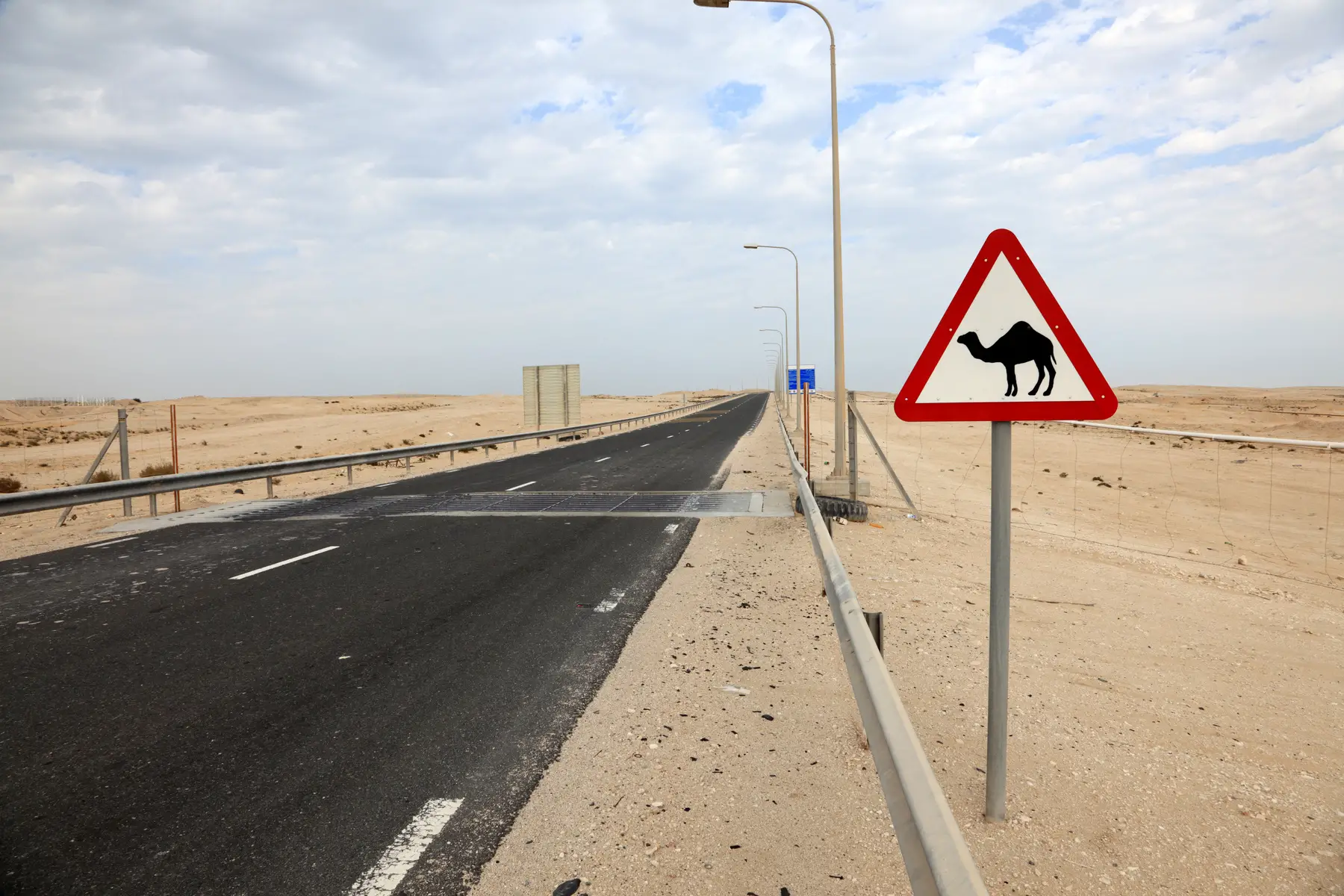
Driving in Qatar presents few challenges. Cars are left-hand drive, and the vast majority are automatic. Roads are generally in very good condition, even outside the city. Doha’s traffic, however, is another matter. Be prepared to negotiate jams as the city gears up for the 2022 FIFA World Cup; and avoid the ring roads at rush hour if you value your sanity!
Given the congestion in town, Qatar’s drivers enjoy putting pedal to metal on the open road. But don’t be tempted to join them. There are speed cameras, and you will be slapped with a fine if you are flashed.
Driving hazards in Qatar
Although normal road conditions should present few challenges, driving in Qatar might also mean dealing with less familiar hazards. Thick sandstorms can quickly engulf roads, reducing visibility dramatically and dangerously. Camels sometimes wander across unlit roads at night and make a potentially deadly obstacle. Furthermore, the scorching summer sun makes breaking down a real health risk.
Driving a car in Qatar is therefore about applying common sense. It pays to be vigilant at all times. Keep the car in good nick. Don’t head blindly off-road unless you know exactly what you’re doing (and where you’re going). Oh, and keep your mobile charged, just in case.
Driving in Qatar is not just about hazards and challenges, however. The wide highways make getting around a doddle, and navigation is a cinch; the bilingual (Arabic and English) road signs are clear, and there’s always sat nav to rescue you from bother.
All matters related to driving and vehicle licensing in Qatar are handled by the Ministry of Interior’s Licensing Affairs Department.
Who can drive in Qatar?
The legal minimum driving age is 18. Holders of licenses issued in the EU, the Gulf Co-operation Council (GCC), Andorra, Australia, Brunei, Canada, Hong Kong, Iceland, Japan, Liechtenstein, Malaysia, Monaco, New Zealand, Norway, San Marino, Singapore, South Korea, Switzerland, Türkiye, the United States, and Vatican City can drive in Qatar for one week upon arrival. After that, a three-month Temporary Licence (cost QR150) is available from the Licensing Affairs Department. Alternatively, an International Driving Licence is valid in Qatar for six months from the date of arrival.
Drivers with disabilities in Qatar
Drivers with disabilities or impairments will be referred by the Traffic Department to the medical services authority to issue a disability type report. A driving license, stating the nature of the disability, will be issued based on the medical report. Disabled parking permits are available from the Traffic Department. Disabled parking spaces are located across Doha.
Getting a driving license in Qatar
Resident expats can obtain a full Qatari license (this costs QR250), which is valid for five years. If you hold a license from one of the countries listed above, it’s a simple case of exchanging the license through the Ministry of Interior’s Traffic Department at Madinat Khalifa. If not, or if you are a newbie to driving, you will have to take lessons at a driving school, followed by a test.
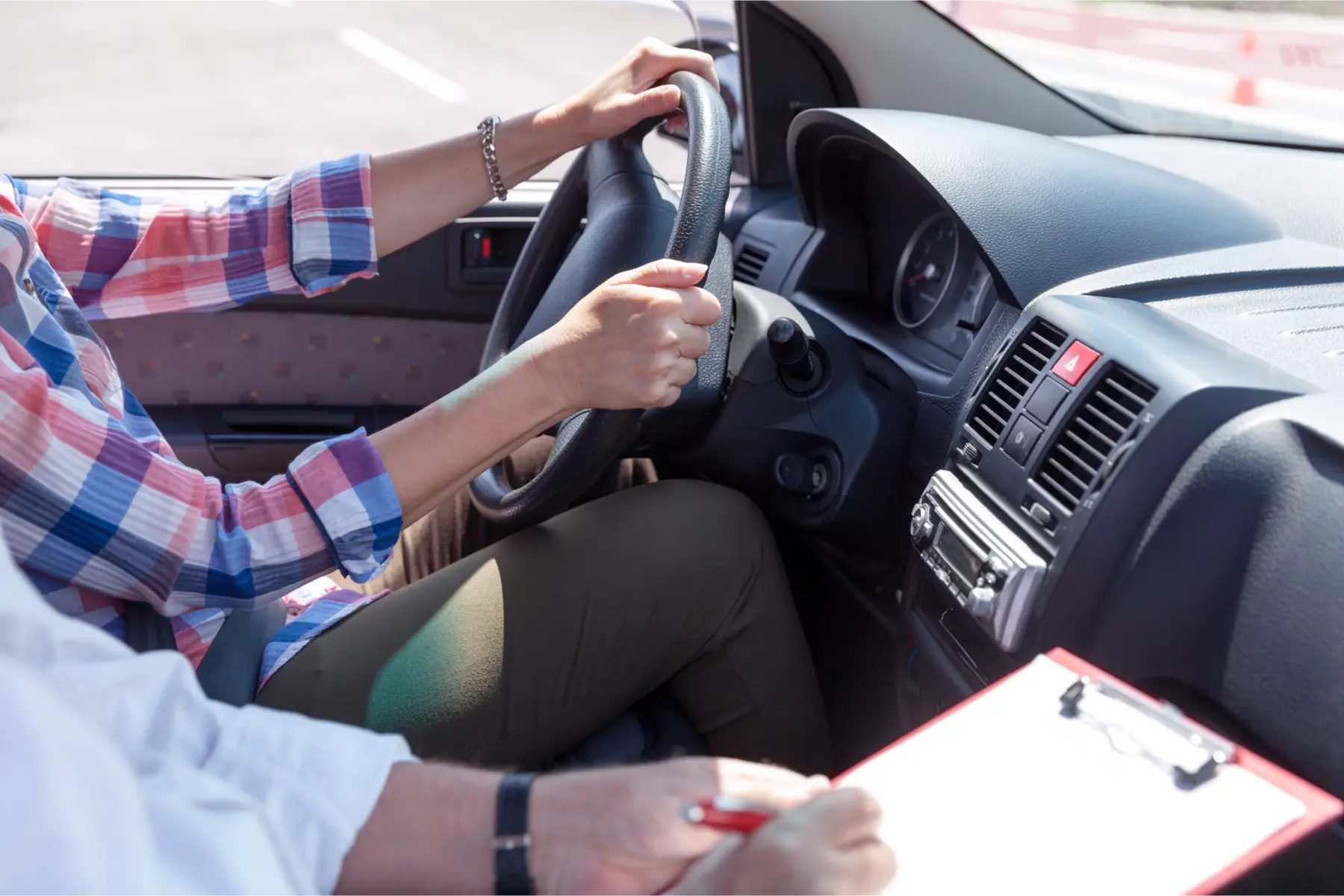
A Qatari license can be renewed (this costs QR250 for another five years) in person at the Traffic Department (or at a Ministry of Interior service center), or by signing up to Hukoomi, the government e-services portal.
Exchanging a foreign driving license in Qatar
Holders of licenses issued in the EU, the Gulf Co-operation Council (GCC), Andorra, Australia, Brunei, Canada, Hong Kong, Iceland, Japan, Liechtenstein, Malaysia, Monaco, New Zealand, Norway, San Marino, Singapore, South Korea, Switzerland, Türkiye, the United States, and Vatican City can exchange their license for a five-year Qatari license without taking a test. Take the following to the Traffic Department at Madinat Khalifa:
- Original foreign license
- Your original passport and copy
- Sponsor’s no objection letter (in Arabic)
- Your sponsor’s trade license copy
- Qatar ID card
- Sponsor’s ID copy
- Three passport photos
- Application form (completed in Arabic), signed by the sponsor
- Eye test (taken, and paid for, at the Traffic Department)
- QR250 fee, payable by card only
Car registration in Qatar
All car owners must register their vehicle (this costs QR100) at the Traffic Department. Take the car, along with a completed (downloadable) application form, sponsor’s letter, and documents to prove the car is insured for one-year. Hukoomi provides plenty of information on vehicle registration procedures. Note that car registration plates are in Arabic and English.
Driving costs in Qatar
Driving a car in Qatar may be gentler on your wallet than in your home country. Cars are often cheaper to buy, run, and maintain compared to many countries. Some of the main costs to factor in when driving in Qatar include:
- Annual vehicle inspection (Fahes) – every car in Qatar must pass an annual inspection (this costs QR150). There are inspection stations located across the country;
- Maintenance – Qatar’s hot, corrosive climate is no friend of your car or its bodywork and mechanical parts. Maintenance costs can mount. Be proactive with car care – have an oil and filter change every 5,000 kilometers or every three months, whichever is sooner. Original spare parts in Qatar can be expensive (less so for Japanese models), but labor is not. A basic service (oil change and filter) might be in the region of QR200. A new car will be under warranty and, depending on the terms of the contract, services, and maintenance will be carried out by the agent/dealer for a specified period;
- Insurance – A minimum third-party insurance coverage is mandatory (a 12-month policy must be submitted to register the vehicle). Once insured, anyone can drive the car if they are eligible to drive in Qatar. Many companies offer car insurance. These include Doha Insurance Group, AXA, and QIC;
- Petrol – a liter of premium-grade petrol is set by the government at QR1.70, about half the global average;
- Tax/tolls – there are no road taxes or tolls in Qatar.
Driving rules and penalties in Qatar
The most basic rule of thumb when driving in Qatar is to have a valid license. If you are caught without one, you will probably receive a fine, or possibly a jail term. If you are in an accident without a license, any insurance will be void; you may be left with a huge bill and legal charges.
General road rules in Qatar
Although some drivers appear to flout them, there are road rules in Qatar. Assume that they will be enforced, either by traffic police or by the ever-widening network of speed cameras across the country. Failure to abide by rules could mean a fine, points on your license, or even a driving ban.
Seat belts are mandatory for all passengers. It is a legal requirement for a child under 12 to sit in the back of the car. When overtaking, the vehicle in front must be passed on the left. When entering a roundabout, you must give way to vehicles already on the roundabout.
Keep the driving license, registration documents (istimara) and insurance details in the car, as traffic police may ask for them if you’re stopped (or have an accident).
Qatari driving licenses run on a points system. The license is suspended for three months once the driver amasses 14 points in a 12-month period. Repeat offenders will see their license suspended for longer, or the license may be canceled permanently.
Violations can be viewed, and paid for, on Hukoomi.
The speed limit in Qatar
Speeding is a leading cause of accidents (and deaths) in Qatar. Speed limits vary from 60km/h in built-up areas to 120km/h on national highways.
Penalties
- Exceeding the speed limit: QR500 fine and four points on the license. Additional QR100 for every 10km/h over the speed limit.
- Driving under the influence: Expect a jail term of at least one month, plus a fine of between QR10,000 and QR50,000. Deportation at the end of the jail term is likely.
- Using a mobile phone while driving: QR500 fine
- Driving without a license in Qatar: QR1,500 fine
- Using a non-registered vehicle: QR3,000 fine and two points on the license
- Driving without a seatbelt (driver or front-seat passenger): QR500 fine
Road signs in Qatar
Road signs in Qatar are bilingual (Arabic and English). In 2019, work began on assigning numbers to all highways and internal roads in Qatar.

Traffic information in Qatar
Qatar is small and, outside Doha, traffic is generally light, especially outside peak times. Google Maps is the ‘go-to’ navigation and information source for drivers in Qatar. The Waze smartphone application also provides real-time traffic reports. The Ministry of Interior’s Twitter account has regular traffic updates, as does QBS, the state English-language radio station.
Parking in Qatar
Doha is a busy, bustling city and parking space can be at a premium (especially during the working day). There are multi-story car parks across the city, and parking facilities in shopping malls and hotels. There is also metered street parking. The majority of residential and commercial buildings in downtown Doha will have underground parking, normally reserved for permit holders.
Parking fees (payable by the Q-Parking app, as well as card and cash at machines), are reasonable, with downtown rates around QR3/hour. Parking fines can be paid via Hukoomi.
Road accidents and breakdowns
Road accidents in Qatar
A total of 168 people lost their lives in traffic accidents in Qatar in 2018. That’s down from 177 in 2017. There were also 7% fewer accidents in 2018, compared with 2017.
If you are in a minor prang (and uninjured), pull over to a safe area. It is, in theory, possible to be fined QR1,000 fine and get three points on the license by obstructing traffic in the event of an accident. In addition, put the hazard lights on. Take photos of the accident scene. If both (or all) cars in the accident can be driven safely, then head to the nearest traffic police station, along with the driver of the other car(s).
It would help to bring an Arabic speaker. As well as the car and photos, submit your driving license, ID, vehicle registration document (istimara), and a copy of the insurance policy. The police will then prepare a report (in Arabic) determining culpability. The relevant insurance company will then advise which garage to use for repairs.
For accidents where a car is incapacitated, call the police (999), who will attend the scene and prepare the accident report. If there are any injuries, call the ambulance service (999) first, advising of location.
Vehicle breakdowns in Qatar
Breakdowns may be annoying, but you are rarely far from help in Qatar. If you find yourself stuck, get the car safely off the road, and put the hazard lights on. Use a warning triangle if you have one. And then call a breakdown recovery service. Reliable breakdown and recovery services in Qatar include Arabian Automobile Association (AAA), Qatar Car Towing, MG Car Towing, or Alawn Roadside Assist.
While waiting for assistance, seek shade and drink plenty of water.
Cars in Qatar
Having just landed at Hamad International Airport and hitting the highway, you’d be forgiven for thinking that every other car on the road is a Toyota Landcruiser.
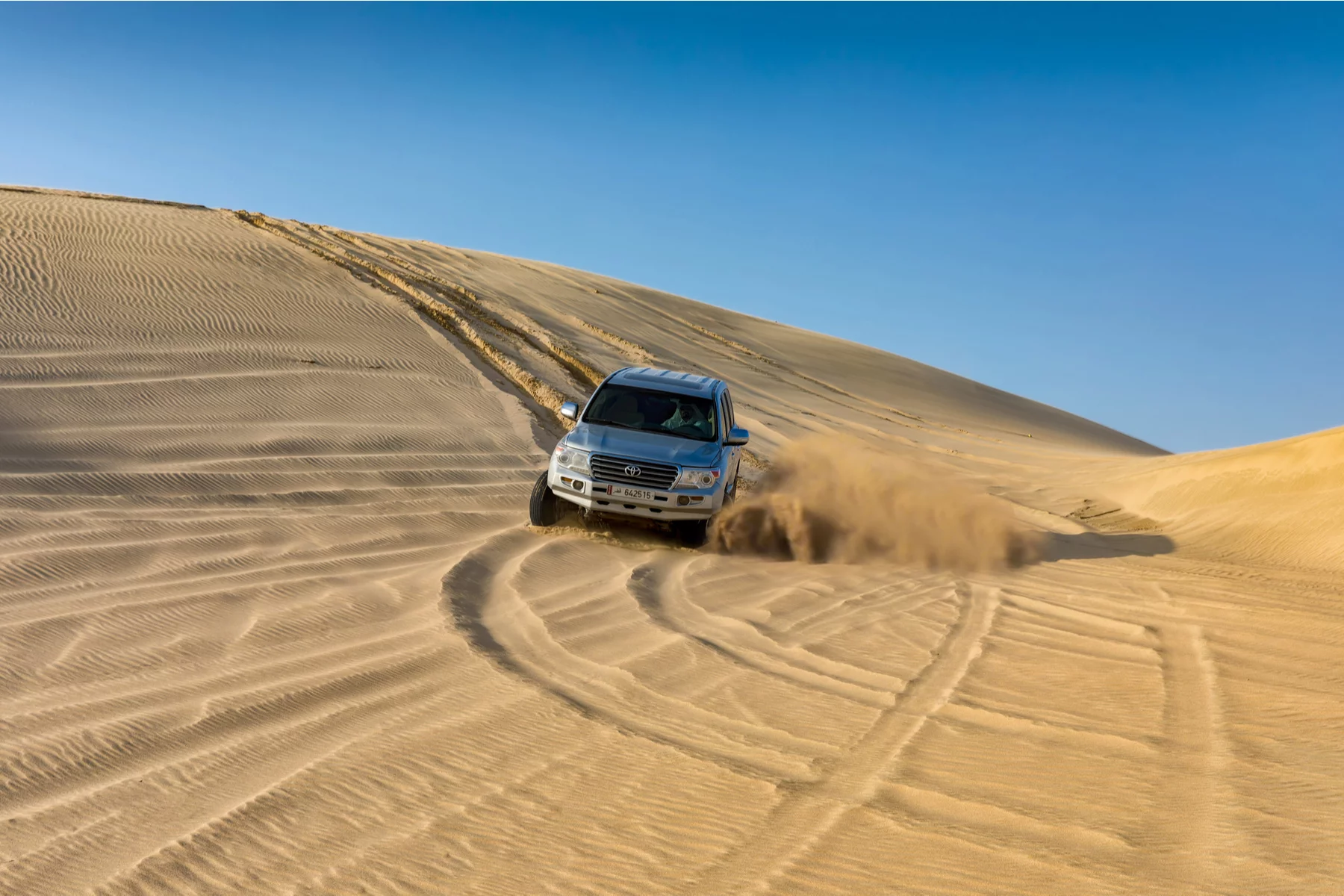
It’s true that the country has an enduring love affair with chunky, gas-guzzling Japanese SUVs, but in Qatar your choice of wheels is limited only by your budget. Here, supercars vie for road space with sensible family saloons. As throughout the Gulf region, Japanese cars are valued for their reliability (and good aircon) in harsh conditions. German makes are popular among expats, too.
Importing a car into Qatar
Unless you’re moving to Qatar from a neighboring Gulf country (and that’s unlikely at the moment due to an economic and trade embargo on Qatar), it’s unlikely you will be importing a car. But, if you’re determined to do so, consider this: the car will have to be less than five years old; a customs duty of 5% of the current value of the car will be payable; and you will need to already be a resident in Qatar. Also, find out if spare parts for the car you are importing are readily available in Qatar.
Once the vehicle is in Qatar, it will need to be registered. This involves an inspection, and you will need to submit documents including the car’s home country registration certificate, it’s purchase invoice (detailing the car value), and insurance papers. Once registered, a local certificate (known locally as istimara), will be issued.
Buying a car in Qatar
Many expats in Qatar, especially those on longer contracts, buy a car for the duration of their stay. The purchase and on-the-road costs of a car are reasonable, and the procedures are relatively straightforward.
To buy new, head to a dealership; all main car brands are represented by a local distributor. Here you can test drive the car, and they will handle registration formalities and also help arrange finance via a local bank.
For second-hand cars, there are auction houses and showrooms across Doha, or online traders such as Q Motor or Qatar Sale.
Even though Qatar remains a nation of petrol heads, there are big plans to roll out electric cars. Launched in 2017, the national Green Vehicle Initiative aims to have electric cars make up 10% of the total number of cars on Qatar’s roads by 2030.
Selling a car in Qatar
Selling a car in Qatar is easy. You can use an online trader such as Q Motor or Qatar Sale to upload vehicle details and photos. Expect to haggle with interested parties, so factor that into the advertised price.
A key consideration when selling a car in Qatar is the transfer of ownership. This can be done either in person (by submitting documents at the Traffic Department at Madinat Khalifa), or by subscribing to Metrash; an online service provided by the Ministry of Interior. Note that you will need to obtain a Vehicle Ownership Transfer Certificate (details on Hukoomi).
Hiring a car in Qatar
Hiring a car (lease hire) is popular in Qatar, and most international rental companies (for example Avis, Hertz, Budget, Enterprise, Sixt, and Europcar are reliable local outfits) offer this service to resident expats. These are a popular and hassle-free option as you won’t be lumbered with maintenance costs. Rental stations are located in Doha, including at the international airport. Online booking is a normal practice in Qatar.
One-off rental costs are reasonable: you’re looking at $40 per day for a compact and up to $150 per day for a large sedan. And SUVs are available too: $150 per day for a Toyota Prado, for example. More competitive rates are available for longer-term leases.
To hire a car in Qatar, you generally need to be at least 21.
Carpooling/car sharing in Qatar
Many expats who car share in Qatar organize it privately through friends or work colleagues. But professional carpooling and car-sharing networks are increasingly popular in Doha and across Qatar. Carpool World, for example, has its own Qatar section. Check out social media, too, such as the Car Pooling Doha Facebook page.
Car repair in Qatar
If your employer provides a car, or if you are on lease with a rental company, then you will mercifully avoid the headache (and expense) of getting repairs done. If you are on your own, you will need a reliable mechanic. The good news is that Qatar is full of them. Repairs are relatively inexpensive because of low labor costs, however, bear in mind that, depending on the car make and model, original spare parts can be steep.
Tips on driving in Qatar
Our tips for driving in Qatar will ensure you get from A to B safely and securely.
- Grow a pair of eyes in the back of your head!
- Be vigilant at night on unlit roads. Hitting a camel is a real risk, even on main roads.
- Give road rage a wide berth.
- Slow down when approaching large intersections, even if you’re on a green light. Cars jumping red lights does happen.
- Keep your phone battery charged in case of emergencies, especially when outside Doha.
- Keep plenty of water in the car at all times.
- Unless you’re experienced at desert driving, stay on the tarmac. It’s easy to get stuck (and disorientated) in the sand.
- Stick to speed limits. There are cameras everywhere.
- Beware of the sunset during the holy month of Ramadan. Drivers may have been fasting all day and may be in a rush to get home to break the fast, tired and hungry. On the plus side, roads are almost deserted at this time.
- At gas stations, someone will fill the car for you. They may also offer to clean your windows for a small fee while you wait.
- If you have an accident, and if you’re able to, move out of the way and call the police. Ideally have an Arabic-speaking friend you can call to assist.
- Never attempt to bribe a policeman.
- Always wear a seat belt.
- Never use your mobile phone when driving.
Useful resources
- Hukoomi – the Qatar e-government portal
- The Ministry of Interior’s General Directorate of Traffic – responsible for traffic and licensing affairs
